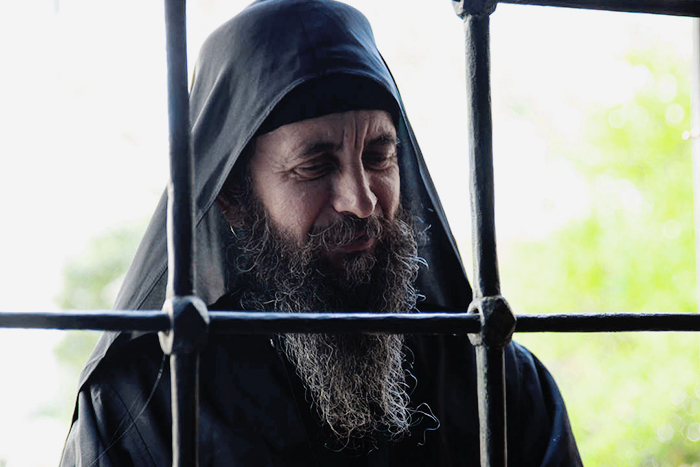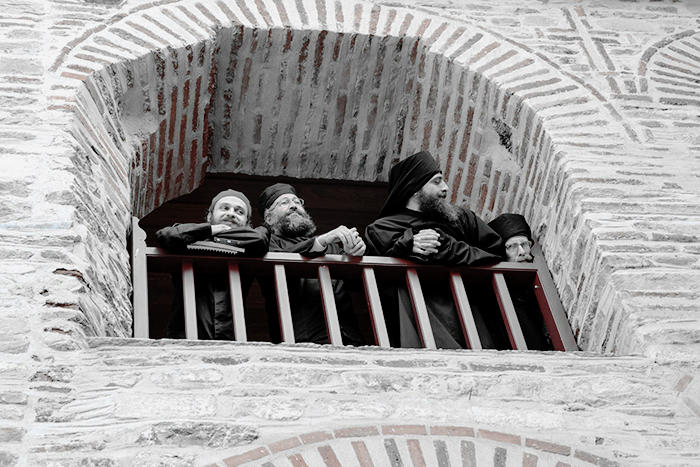
The higher you climb, the worse the fall.
Monasticism is not one of the Church Sacraments technically, but in essence it is: when one is tonsured, the person takes vows and undergoes changes, up to and including the change of name. It is possible to call monasticism the second baptism to some degree (albeit with great caution). Unfortunately, just as some people receive baptism without being aware of the true meaning of the Sacrament, monasticism is often misunderstood as well.
1. “Monks Are More Likely To Be Saved Than Lay People.”
It is a naïve and utterly erroneous notion that monasticism as such brings man closer to the Kingdom of Heaven. The famous story of the Alexandrian shoemaker, who succeeded in his quest for salvation by mere domestic piety more than a desert monk, testifies that lay people are no more sinful than monks. Monasticism is a way of life and, so to speak, a commitment to salvation.
On the other hand, monks will be judged for their sins more severely than lay people. All it takes to understand this is to look at the illustration to The Ladder of St. John Climacus: a ladder which monks climb while their angels try to support them and demons try to knock them down. The higher you climb, the worse the fall.
2. Monasticism As Career
Oddly enough, there are people who want to make a church career through monasticism. Men want to become priests and then bishops, women want to be abbesses. Let’s not count them among the usual self-seekers. More often than not, those who pursue monasticism as a career hope to benefit the Church, create something new, destroy flawed practices, and so on.
What’s wrong with that?
First of all, the life of a church careerist is just incredibly boring – neither fish, fowl, nor good red herring; it has no taste or smell. Either one becomes a bad monk who breaks his vows, or one becomes a bonded monk, forced to live a life that is not at all his preferred way of living, while waiting for the desired bishopric. Metropolitan Hilarion (Alfeev) writes more harshly, “It is not uncommon for such people at an advanced age to find themselves in a situation where they realize that their desire is unattainable, that they have “fallen out of the circle”, or that they have never been included in the “circle” that supplies the cadres for the bishopric. Imagine the terrible crisis that looms over them. The person realizes that he has ruined his life, having missed out on so much for the sake of illusion.
Secondly, the Church doesn’t need to be rescued, it is us who need the Church for salvation. Surely, trying to protect the Church as a religious community and to overcome some difficulties is quite a worthy cause. Nevertheless, one should do it in one’s own place and not to rush anywhere. This is the Christian humility without which it is impossible to be saved.
3. Becoming a Monastic out of Obedience
You can’t make fateful decisions based on obedience! Presumably, we cannot add anything to the words of “the father of modern monasticism” Saint Ignatius (Bryanchaninov):
“It’s wonderful that you want to be in full obedience to an experienced adviser. This feat is not available to our time. It is absent not only amid the Christian world, but also in monasteries. Mortification of one’s mind and one’s will cannot be done by a non-spiritual person, even if he is kind and pious. For this purpose, a spirit-filled priest is needed; only a spirit-filled priest can see through the soul of a disciple before him, only he can detect where and from where the spiritual movements of the one he is teaching are directed…
In this regard, the apostle also commanded, “Be not ye the servants of men” (1 Corinthians 7:23). The Apostle commands that the very service of the masters should be done spiritually, and not as human-pleasers do, but as the servants of Christ who fulfill God’s will by serving others (Ephesians 6:6). “Do I seek favors from people nowadays,” he says, “or from God? Do I try to please people? If I still please people, I would not be a servant of Christ. Do you know to whom we give ourselves as slaves to obey? Should it be a man of carnal wisdom or God whom we must obey as slaves, either leading us from sin and carnal wisdom unto death, or to God’s righteousness and salvation” (cf. Romans 6:1)?
Indeed, we can’t truly see how “spiritual” the elder standing in front of us is. Even the best elders can be misguided, make mistakes, or fail to grasp the true spiritual needs of the person who comes to them for help. Therefore, you should listen to the advice of wise priests, but treat it soberly. Even the most experienced priests are just humans.

4. Entering A Convent Because Of Unrequited Love
“I will never love anyone again!” a 20-year-old girl or a 40-year-old woman sobs after breaking up with her boyfriend or husband and leaves to work in a remote convent.
Ideally, if the abbess of that convent is clever enough and the novitiate lasts for a few years, then the girl in question will cool down.
Things can get much worse if she is received in the convent without any hesitation. Two months later, she will write a tonsure request, which will immediately be granted so as to help the sister to cope with her passions.
A couple of months or weeks later, the storm of passion will calm down in the new nun’s heart, and she will be asking in terror, “Who am I? What am I doing here?!” At best, she will leave the monastery. At worst, it will drive her into a severe depression or provoke a mental disorder.
5. “Oh, How Beautiful Monasticism Is!”
I have no education, no strong social and friendly ties, no family, and I hate my job… Or I might even have an education, friends and a favorite job, but oh! Long clothes! Prayer ropes hanging down to the floor! The veil flowing from a klobuk! All-Night Vigils and humble labor! How beautiful it is… you can’t compare it to this ugly world, huh?
Why not try living in a monastery?
No, dear friend. This is not how you become a monk or nun. The world is no less nice and wonderful. Your work can be just as modest, and your prayer can be equally heartfelt. Monks may have to work in the barn, in the office, in the refectory. Their duties can be physically or intellectually taxing, boring, frustrating, and detrimental to their health, let alone prayer.
The sole raison d’être of monasticism is the desire to commit oneself to Christ completely and unconditionally. It is the fear of getting away from Him in the bustle of days and the joy of being in His presence.
Translated by The Catalogue of Good Deeds




Thank you very much for this wise article. Just as one should strive for purity as we receive the Sacraments we must examine our motives and calling before we seek to become monastics or consider becoming members of the clergy. I have tremendous respect for those who work out their salvation as Monastics or serve as clergy in every position, but I am not worthy and God has called me to do other things. I must seek to grow where He plants me. I humbly ask that you pray for me a sinner.
You are so welcome, dear Christopher! God bless you!
if your mother made a tamma for you to become a monk in a monastery at the age of seven and from that day on it has always been in your mind somewhere lurking around making you enjoy life to the fullest but never really committing to anything on a long term basis, is it ok to join a monastery as just a beginner to figure out if it is really for you or not.
Dear Andreas, nobody’s stopping one from trying. For this purpuse there is such a thing as noviciate.